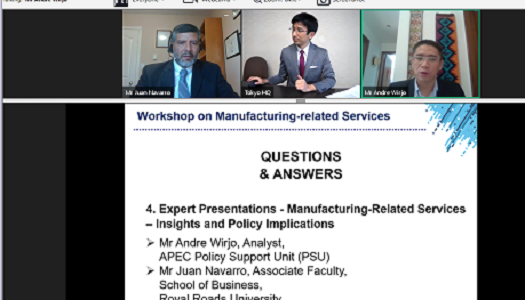Navarro presented at APEC - relevance of services in manufacturing

Associate Faculty, Juan Navarro, was invited as one of the two experts to present during the International Event organized by the Asia-Pacific Economic Cooperation (APEC) on August 19th, which was titled Manufacturing Services Workshop: contribution to the final Review of MSAP. This online workshop was broadcasted across the 21 economies that form part of APEC including China, Russia, Japan, Korea, United States, Canada, Mexico Peru, Australia, and New Zealand. The event was attended by APEC authorities, members, businesspeople and leaders in the international trade field that wanted to improve their understanding and knowledge on the manufacturing-related services and how these kinds of services can be utilized as a tool to overcome the global pandemic and create prosperity for all.
During this workshop, Navarro presented his comparative analysis of the Manufacturing Related Services Action Plan (MSAP) in the Context of the Comprehensive and Progressive Agreement for Trans-Pacific Partnership (CPTPP), which he defined as a new generation trade pact and an important pathway to achieving the eventual Free Trade Area of the Asia Pacific (FTAAP). Navarro pointed out that services are a source of competitiveness and productivity for manufacturing due to their strong integration that has a positive impact all along regional and global supply chains. Navarro’s analysis was based on seven policy implications that affect the availability and accessibly of services in manufacturing namely investment policy inconsistencies, labour-related restrictions, localization and human capital constraints, challenges that Small and Medium Enterprises (SMEs) face in order to participate in Global Value Chains (GVCs), infrastructure bottlenecks, and issues on Intellectual Property Rights and Trade Policy.
Navarro recommended that future discussions and commitments on services in manufacturing incorporate strong elements to promote a free, open, fair, non-discriminatory, inclusive transparent and predictable trade and investment environment by leveraging on digital connectivity, refraining from imposing new obstacles to trade and investments, facilitating, even more, cross border trade in services, and supporting collective efforts to engineer a more resilient and inclusive multilateral trading system. Navarro concluded saying that addressing issues of Services in Manufacturing has to be taken seriously, keeping in mind that high-standard regulations in manufacturing-related services may contribute to economic recovery and set out the foundations for higher economic integration in the Asia-pacific.